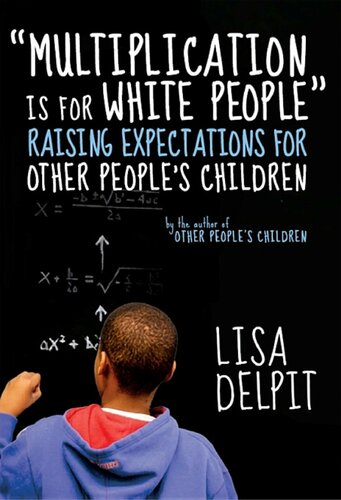
"Multiplication Is for White People"
Raising Expectations for Other Peoples Children
کتاب های مرتبط
- اطلاعات
- نقد و بررسی
- دیدگاه کاربران
نقد و بررسی

January 16, 2012
A decade after her award-winning Other People’s Children: Cultural Conflicts in the Classroom, MacArthur Fellow and education professor Delpit, her passion unassuaged, takes a fresh look at education practice and theory with a sharp focus on “children marginalized either by income-level or ethnicity—or both.” Exploring four stages (infants, early childhood, adolescents, college age), her book is full of firsthand observations of teachers and students in multiple settings, most commonly the inner-city, and trenchant anecdotal accounts of her own experiences with her daughter’s “often difficult travels through school,” some predominantly white, some predominantly black. Delpit’s assessments of Teach for America and No Child Left Behind, while respectful of the goals, are critical of both the practices and the results. In reviewing current scholarship, she offers jargon-free explanations of current terminology (like “stereotype threat” and “microaggression”), and clarifies arguments with graphs and statistics. This is very much a book for teachers and education professionals, but anyone concerned with the state of American schooling will find Delpit’s smooth blending of the personal, the professional, and the political appealing and illuminating.

December 15, 2011
A call-to-action book on how to close the racial achievement gap in the American educational system. Despite having an African-American as president, MacArthur winner Delpit (Education/Southern Univ.; Other People's Children, 1995, etc.) writes that African-American students are still not being treated as equal to their white peers. Using numerous examples from school situations and her own daughter's experiences, the author shows that stereotypes and racial prejudices still abound, with many teachers teaching "down" to their black students. To counteract this negative effect, teachers need to understand the cultural backgrounds of their students and connect the curriculum to this background so that learning has relevance to the student. Instead of asking "do you know what I know?" Delpit says the question to ask is "what do you know?" "This is the question that will allow us to begin, with courage, humility, and cultural sensitivity the right educational journey," she writes. When good teachers incorporate this method and learn to identify with each individual child, test scores and self-esteem rise and disobedience and absenteeism fall. Delpit feels her work in education is two-fold: She is "charged with preparing the minds and hearts of those who will inherit the earth…as a sacred trust…and the second purpose…is to build bridges across the great divides, the so-called achievement gap, the technology gap, class divisions, the racial divide." If all teachers adopted these ideas, the American educational system would be vastly improved for all students. Covering age groups from preschool to college, Delpit offers advice to new and veteran teachers, advice that applies not only to African-American students but to all ethnic and minority groups. A much-needed review of the American educational system and an examination of the techniques needed to improve the teaching methods of all involved in that system.
(COPYRIGHT (2011) KIRKUS REVIEWS/NIELSEN BUSINESS MEDIA, INC. ALL RIGHTS RESERVED.)

























دیدگاه کاربران